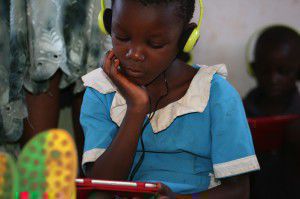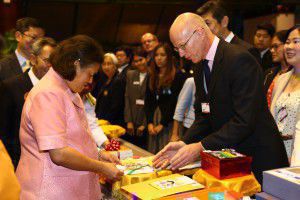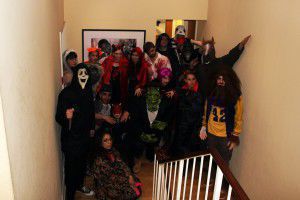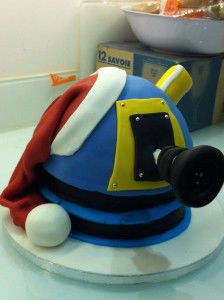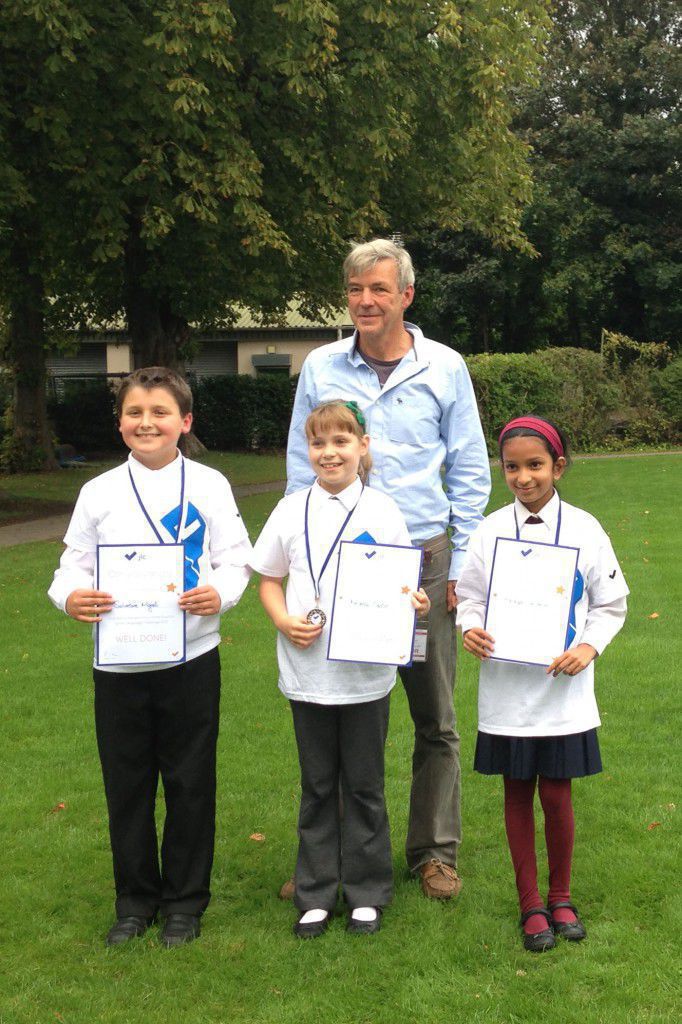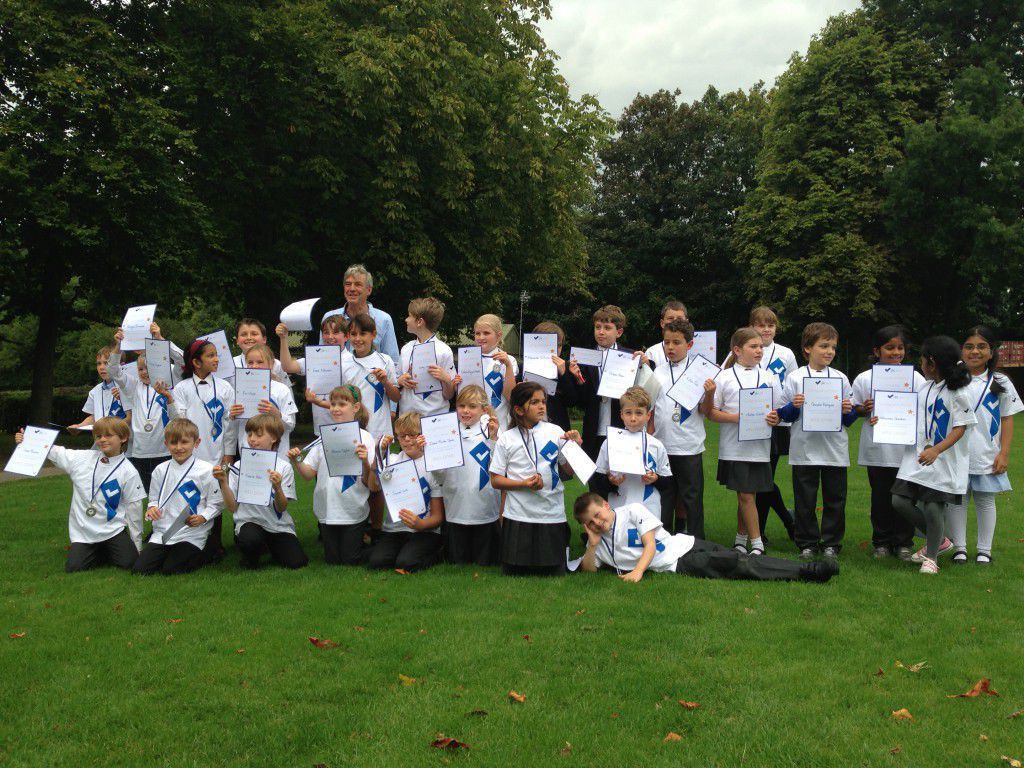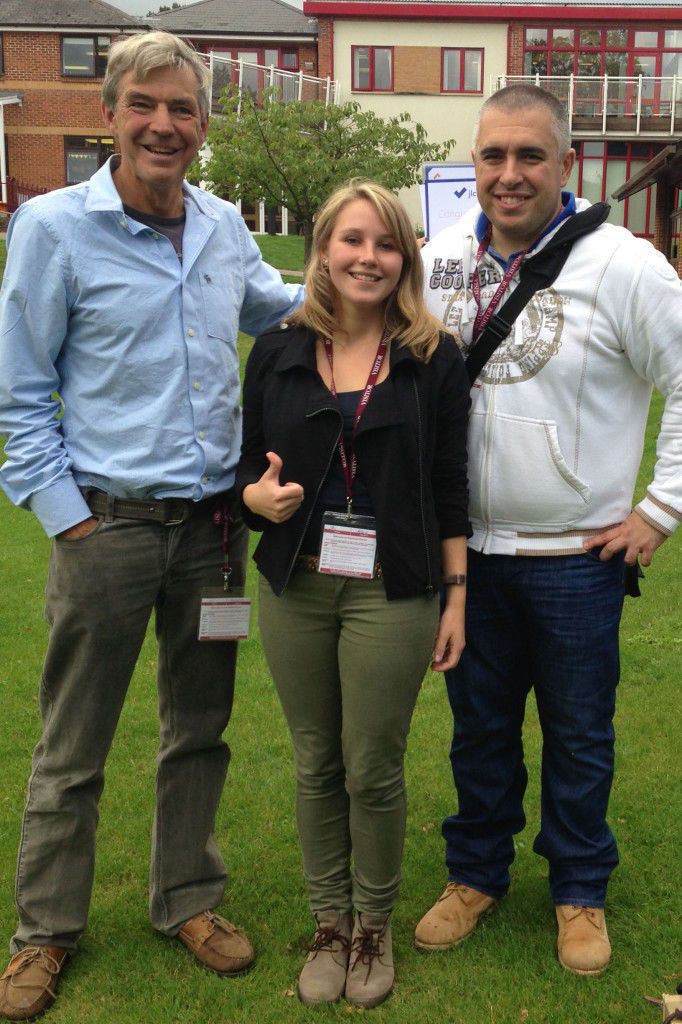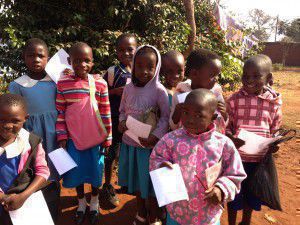EuroTalk: a look back at 2013
It’s been another busy year at EuroTalk, with new products, new languages… and a new puppy. Throw in a royal encounter and a cake that looks like a Dalek, and you’ve got the makings of an interesting twelve months.
Languages
In June, we launched our new app for iPhone and iPod touch, uTalk. This had been in development for a long time, and we were really proud and excited to be able to share it with the world. It’s got more content and more activities, and it’s free to download and start learning the essential words you need to get by in 60 languages. We’ve been adding more languages regularly since the app was launched, and will continue to do so over the coming months. So if we haven’t yet got the language you need, don’t worry – we soon will.
And that’s not all. Last month, we added Lao, the official language of Laos and also spoken in the north east of Thailand, to our range with the release of Talk Now, our beginner program for PC and Mac. Lao has about 15 million speakers worldwide, and is a language we’ve been wanting to offer for some time now. There are more new languages on the way in 2014, so watch this space…
Maths
This year also saw the launch of part 2 of our second maths app, Maths, age 4-6, and two new practice apps – Count to 10 and Count to 20. We also released a version of Maths age 3-5, for schools, so teachers can use the app in the classroom.
Malawi
We’ve been working in Malawi now for several years, as part of our mission to ensure one billion primary age children reach their full potential in numeracy, reading and English. This year, Dr Nicola Pitchford from the University of Nottingham conducted an evaluation at Biwi Primary School in Malawi, to measure how effective our maths apps are for the children’s learning, compared to other teaching methods, including other apps. The preliminary results show that not only did the group using our apps perform significantly better than the other groups, but in fact they tripled their maths knowledge in just eight weeks. This is really exciting and encouraging, and we hope now to scale up the project in Malawi to reach more children, in more schools.
Junior Language Challenge
2013 saw the return of the JLC, after a year off in 2012. Our annual language learning competition for primary age children across the UK is always very popular, and this year was no exception. We were joined at the final by Martha Payne of NeverSeconds, who at just 10 years old, has raised over £140,000 for Mary’s Meals, a charity providing school dinners to children in Malawi. Martha, with her dad and her sister, was our special guest and handed out the prizes to our finalists, including the JLC Champion for 2013, Ella Whittingham from West Bridgford, Nottingham.
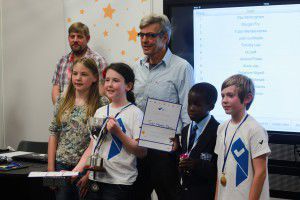
Martha Payne with JLC Champion Ella Whittingham, runners-up Morgan Fry and Tudor Mendel-Idowu, and EuroTalk Chairman Richard Howeson
A Royal Visit
In October, Steve was honoured by a visit from Her Royal Highness Princess Maha Chakri Sirindhorn of Thailand, while at an exhibition in Bangkok. The Princess came to have a look at the EuroTalk stand, and later Steve presented her with a gift on behalf of the company. He had to be instructed on the correct way to bow, and fortunately he got it right!
New arrivals
This year, we’ve said a sad goodbye to Glyn, Tom and Hanna, but welcomed Safia, Seb and Pablo. We’ve also been lucky to have Lorena with us from Germany for a few months; you may have enjoyed some of her blog posts! And in August we welcomed Molly the puppy, who caused a certain amount of mayhem, but was very easily forgiven because she’s so cute.
Fancy dress fun
We entered into the ‘spirit’ of Halloween by getting dressed up for the occasion. With everything from vampires to skeletons, pumpkins to werewolves, we were quite a sight to behold. Although some of us were scarier than others…
Lots of cake
We’ve always enjoyed a bit of cake here at EuroTalk, but this year we’ve been thoroughly spoilt, with keen bakers Safia and Alex (but mostly Safia) providing us with masterpieces like this amazing Dalek cake. (It took us three days to eat, but it was totally worth it.)
And so the year has come to an end in style. Thanks as always for reading our blog, and to our guest bloggers who’ve been in touch over the last year. Please do contact us if you have something you’d like to share!
Happy New Year, everyone – see you in 2014!
Toddler Talk: How to Encourage Your Little One to Learn Language
Today’s post was written by guest blogger, Eve Pearce.
For most parents, a child’s first word is a huge milestone – the first step in learning communication, language and the beginning of a whole lot of chattering. After the initial ‘mamas’ and ‘dadas,’ a string of other words usually start to flow but this isn’t always the case. Up to 6 million children in the United States suffer from some sort of speech or language disorder which can affect their ability to talk. Others may not have a disorder but simply take longer to develop their speech and language skills. Despite experts suggesting that toddlers will be at least three years old before being able to form short sentences, there are things that you can start doing much earlier on to encourage your child to talk. Here are some tips to help encourage your little one to learn language and what to do if your child won’t talk.
What if my child won’t talk?
 It’s important to remember that children develop at different rates so comparing them to their peers isn’t always helpful. Sometimes there are simple reasons why a child doesn’t speak much. For example younger siblings can sometimes be quieter because they allow their older siblings to talk for them. Other times children may develop in physical areas such as crawling, walking and climbing more quickly and this detracts attention away from their interest in talking. But if you feel that your child has reached an age where they should be speaking more than they are of if you are generally concerned about a lack of response to your attempts to interact with them it could be worth seeking advice from a paediatrician or speech therapist. Unfortunately developmental delays in children do exist and conditions such as Apraxia, Dysfluency and ADHD are relatively common and all affect speech and language skills. Getting these diagnosed will help you get the professional advice you need in order to help your child move forward with their language.
It’s important to remember that children develop at different rates so comparing them to their peers isn’t always helpful. Sometimes there are simple reasons why a child doesn’t speak much. For example younger siblings can sometimes be quieter because they allow their older siblings to talk for them. Other times children may develop in physical areas such as crawling, walking and climbing more quickly and this detracts attention away from their interest in talking. But if you feel that your child has reached an age where they should be speaking more than they are of if you are generally concerned about a lack of response to your attempts to interact with them it could be worth seeking advice from a paediatrician or speech therapist. Unfortunately developmental delays in children do exist and conditions such as Apraxia, Dysfluency and ADHD are relatively common and all affect speech and language skills. Getting these diagnosed will help you get the professional advice you need in order to help your child move forward with their language.
Verbalize their feelings
Children communicate with their parents from day one through crying. Over time parents come to recognize the different types of cries and what they mean. As your child develops they will begin communicating in other ways – smiling, gurgling, throwing tantrums and whining. These are some of the more obvious signs but even facial expressions can give away what they are thinking or feeling. If you can verbalize their expressions then they will begin to associate these words with how they are feeling and know what they mean even before they are able to say them out loud. For example if she is smiling at her dolly you say ‘you look very happy today’ or if he is becoming frustrated with something ask him ‘why are you cross?’
It sounds silly but sometimes parents simply forget to talk to their babies. Many wrongly assume that a small baby is incapable of communication and talking is therefore pointless; but actually a baby becomes attuned to their mother’s voice while they are in the womb and talking to them will reassure them, comfort them and interest them even if they can’t understand what you are saying. Alter the pitch of your voice and sing songs. This will grasp their attention. They cannot respond in words yet but you will see from their smiles, gurgles and squirming that they are enjoying the interaction.
Read, read, read
 Introduce books as early as possible. Your baby will probably not start to engage with them fully until six months onwards but reading helps them to associate pictures with words, follow stories and pick up on your expression and emotion as you read. It will help them to not only learn the words but recognize the things in the world around them and develop their listening skills too. Introducing sensory books with fabrics, noises and shapes is also a great way to grasp their attention and increase their interest in books. Similarly, do not feel you have to be totally led by the book at all times. Let the child explore the book at their own pace rather than forcing them to sit still and listen while you finish it conventionally. Developing an interest and love for books means developing an interest and love for language so you need to make it fun to hold their enthusiasm.
Introduce books as early as possible. Your baby will probably not start to engage with them fully until six months onwards but reading helps them to associate pictures with words, follow stories and pick up on your expression and emotion as you read. It will help them to not only learn the words but recognize the things in the world around them and develop their listening skills too. Introducing sensory books with fabrics, noises and shapes is also a great way to grasp their attention and increase their interest in books. Similarly, do not feel you have to be totally led by the book at all times. Let the child explore the book at their own pace rather than forcing them to sit still and listen while you finish it conventionally. Developing an interest and love for books means developing an interest and love for language so you need to make it fun to hold their enthusiasm.
Talk properly
The reason many people talk to their children in ‘baby speak’ is simple – words such as ‘choo choo’ and ‘woof woof’ are more pleasing for a child’s ears and easier for them to say. As young babies it is ok to use this sort of language but as they grow up it means teaching them that actually a ‘choo choo’ is a train and a ‘woof woof’ is a dog, which is double the amount of learning for them. Some child experts believe that talking authentically from the beginning is the best way to help a child develop language skills. They will notice the difference in your tone and language when you speak to other people and wonder why they are being spoken to differently. There is no need to speak to your toddler in a pitch that ten decibels higher than your normal voice just in everyday conversation – this is not natural and yet you want them to learn and mimic natural behaviour and speaking. This doesn’t mean speaking to them in the same way you would speak to an adult; obviously you need to use simpler words and talk a little slower so that they can pick up on everything you say, but do not patronize them.
If anyone has any other helpful tips, please feel free to share them in the comments below.
We’ve heard from parents that our Vocabulary Builder program for 4-12 year olds has been helpful to them in encouraging their children to talk. Even if it’s their own native language, the colourful characters and games are a fun way to build up their confidence. Vocabulary Builder is available in over 100 languages.
Getting to know you: ‘Hallo’ from Lorena
My name is Lorena and I am from Germany. I just finished school and now I’ve started a placement at EuroTalk for five months. This is my third week in the company and it is very exciting. I am working on a project to help EuroTalk promote their maths apps in Germany. I’m having fun thinking about this task and I have a lot of ideas!
On my third day at EuroTalk, Wednesday 18th September, I went to the Junior Language Challenge at the Cranmore School in Surrey. It was the semi-final for London (South). At one o’clock we arrived at the school and prepared the iPads so that the children could use the Greek app.
About thirty thrilled children were ready to start! 🙂
… And after the welcome, it was finally happening.
The children were split up in two groups of thirteen and each group played the games. The children with the best score came into the final. The teachers and some parents could follow which position the children were in, because there was a whiteboard with the current score. For the children it was a very exciting situation and the teacher and parents were pretty curious.
After the challenge I saw only smiling kids! They were so happy and very proud of the certificates they got from EuroTalk.
And for me was it an interesting day and I got some impression of how EuroTalk promotes languages for children.
Lorena
Why I love the JLC
Many people will already be aware of the national languages competition organised by EuroTalk each year, called the Junior Language Challenge. It’s open to all children aged 10 and under, and gives them an opportunity to learn three new languages and compete against other children from their region and ultimately from across the country.
The JLC starts in March and finishes with the final in October. And it’s a lot of work – from a technical point of view (our programmers have literally had sleepless nights getting the software up and running in time) and in terms of organisation. Running a competition like this isn’t an easy task, and with the semi-finals taking place over the next two weeks and the final still to come, it’s only going to get busier.
But I still love the JLC, and here’s why…
Firstly, the children taking part really enjoy it. It’s lovely for us to see their enthusiasm at the regional semi-finals and the grand final in London. Tension’s always high and sometimes there are even tears, which obviously isn’t a good thing in itself, but it does show how passionate the children have become about the competition. In 2011, Ben Fawcett from Chichester even returned early from his family holiday at Disneyworld to compete in the final – that’s what you call dedication.
Secondly, it gives children a love for languages that they can take with them into their future studies and career, and that they might otherwise have missed out on. Marliese Perks from Edinburgh, who reached the final in 2004, wrote to us shortly before she left for university to study Law and Spanish: ‘The competition inspired me to learn languages … little did I know at that age that Spanish and languages would ultimately become my passion … I can’t say thank you enough, you set me on this path and I am loving every minute of it!’ This is the goal of the JLC – to let children know that they can learn languages, and that it can be fun. Not only that but they don’t have to just learn the ones they’re taught at school; Marliese learnt Spanish, Greek and Saami. I’m not sure how often she uses her Saami these days, but what’s important is the JLC showed her she had the ability to learn it, which I think is pretty inspiring.
And finally, there’s a whole other side to the JLC. Each child who enters pays £2.50, and this money is used to purchase tablet devices for schools in Malawi, where class sizes are so huge, it makes teaching a near-impossible task. A tablet that can be shared by several children will fill the gap left by over-stretched teachers, and as a result will literally change lives. A basic education is something that every child should have, no matter where in the world they are, and the competition not only provides opportunities to youngsters in the UK, but it also makes a huge difference for children in Malawi too. I’m proud to be a part of it – albeit a slightly stressed out, panicked part.
To everyone preparing for a semi-final, good luck! To those who’ve already made it through to the final – congratulations, and see you in October 🙂
And to everyone who’s taken part in the JLC – not only in 2013, but every year – thank you.
Liz
Lost in translation: making sense of maths
Reading Nat’s post about all the fascinating linguistic differences and difficulties that she and her translators experienced when translating the new uTalk app, I was reminded of some of the similar issues we’ve had in localising the maths apps. What seems totally normal to a three-year-old in the UK might not be all that familiar to a kid in Malawi, for a start! Not to mention the fact that (unfortunately for us English speakers), not all languages follow our grammar rules. Here are a few of the cultural and language localisation issues we’ve come across recently…
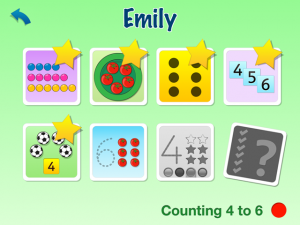 In Swedish, there were a couple of interesting language differences, for example: you cannot use the same word for ‘height’ in Swedish for an object such as a house as for a person (Välj det Längsta barnet – choose the tallest child, but Välj det högsta trädet – the tallest tree), whereas in English we can say short or tall regardless of the object.
In Swedish, there were a couple of interesting language differences, for example: you cannot use the same word for ‘height’ in Swedish for an object such as a house as for a person (Välj det Längsta barnet – choose the tallest child, but Välj det högsta trädet – the tallest tree), whereas in English we can say short or tall regardless of the object.
In Malawi, some of the ‘everyday’ objects featured in the apps probably seemed more than a little strange. In fact, Chichewa is strongly based on words for things that people see and encounter in daily life. Our translator had to get a bit creative and come up with ‘equivalent’ names for objects such as a robot (a doll in the Chichewa version), a turnip (a potato in the app), a dragon (she had to use a description meaning ‘a fierce animal’) or a fridge (replaced by a cupboard). There are also many more ‘technical’ words which don’t exist in traditional Chichewa, such as shapes. These are therefore normally given English names with a slight Chichewa accent (sikweya, trayango, rekitango and so on).
This is quite similar in Wolof: many items simply do not have a name in Wolof, or the words are unfamilar to most young people. Many items are therefore named in French instead, such as animals (giraffe), shapes (cercle) or fruits (banane). Above about 10, Wolof-speakers also tend to revert to French numbers instead of the more complex Wolof system (similar to the Chichewa – 5 and 1, 5 and 2…).
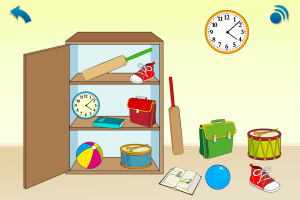 As with the uTalk app, Polish proved an especially problematic language for us too. One of the biggest issues was that in Polish the word for ‘you’ is dependent on gender. The translator mainly dealt with this by saying ‘we’ (e.g. Nauczyliśmy się/robiliśmy – we learned/were learning how to…), rather than addressing the child playing the app as male or female. It is also not usual to use prepositions such as ‘inside’ and ‘outside’ when describing the location of an object. e.g. instead of saying ‘the book is outside the cupboard’, Poles would normally say ‘the book is not in the cupboard’. Similarly to many other languages, some of the objects were also not very familiar: a cricket bat is not a well-known object, so it was translated as kijek – a little bat, and mangoes were translated as owoce – a fruit, as mangoes are not a ‘usual’ fruit in Poland – the same was the case with the Hungarian app, where we translated mango as gyumolc – also a generic word for fruit.
As with the uTalk app, Polish proved an especially problematic language for us too. One of the biggest issues was that in Polish the word for ‘you’ is dependent on gender. The translator mainly dealt with this by saying ‘we’ (e.g. Nauczyliśmy się/robiliśmy – we learned/were learning how to…), rather than addressing the child playing the app as male or female. It is also not usual to use prepositions such as ‘inside’ and ‘outside’ when describing the location of an object. e.g. instead of saying ‘the book is outside the cupboard’, Poles would normally say ‘the book is not in the cupboard’. Similarly to many other languages, some of the objects were also not very familiar: a cricket bat is not a well-known object, so it was translated as kijek – a little bat, and mangoes were translated as owoce – a fruit, as mangoes are not a ‘usual’ fruit in Poland – the same was the case with the Hungarian app, where we translated mango as gyumolc – also a generic word for fruit.
In Portuguese, there is no real way to distinguish between ‘more’ and ‘most’ or ‘less’ and ‘least’. Mais means both more and most, and menos less/least/fewer/fewest. This is also the case in Welsh: ‘bigger’ and ‘biggest’ translate to mwy and mwyaf respectively, but ‘more’ and ‘most’ also translate to mwy and mwyaf. The same goes for ‘smaller’/’smallest’ and ‘less’/’least’ (llai, lleiaf). On the other hand, there are different words for top and bottom shelves. Generally ‘top’ and ‘bottom’ are top and gwaelod but ‘top shelf’ and ‘bottom shelf’ are silff uchaf and silff usaf.
I was also intrigued to find out that in Amharic (an African language spoken in Ethiopia), they have a completely different system for telling the time: ‘1 o’clock’ does not mean lunch time, it in fact means ‘the first hour of the day’, i.e. when the sun comes up, and the rest of the day is counted from there. In fact, “Telling the time’ has been one of the hardest topics to localise, as our ideas of what happens at what time are not exactly international. Our French translator not only found the idea of eating a boiled egg for breakfast rather funny, but also pointed out that schools finish at 5 in France, not 3 as in the app, and a child would eat dinner at 7 or 8, not at 5 or 6! In Spain this is even funnier, as Spanish children regularly eat their dinner at 9 p.m., and go to sleep at 10 p.m. or perhaps later at the weekend or on holiday.
These are just a few of the language and cultural issues we’ve encountered on the maths translation project, and there are sure to be more! We have 10+ new languages ready to be released, and many more in the pipeline, so watch this space!
Alex
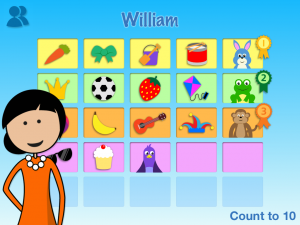 The maths apps are available from the App Store: Maths, age 3-5 and Maths, age 4-6.
The maths apps are available from the App Store: Maths, age 3-5 and Maths, age 4-6.
And also now available (in English only for the time being), Counting to 10, our first maths practice app, is on sale in the iTunes App Store for iPhone, iPod touch and iPad, and Google Play, for Android devices.

